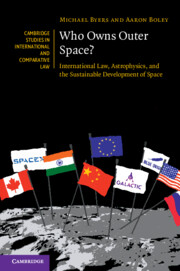Refine search
Actions for selected content:
5 results
1 - Entrepreneurial Ecosystems from Emerging Markets and Their Unicorns: An Overview
-
-
- Book:
- Unicorns from Emerging Economies
- Published online:
- 05 December 2025
- Print publication:
- 08 January 2026, pp 1-22
-
- Chapter
- Export citation
2 - Mega-constellations
-
- Book:
- Who Owns Outer Space?
- Published online:
- 06 April 2023
- Print publication:
- 13 April 2023, pp 46-76
-
- Chapter
-
- You have access
- Open access
- HTML
- Export citation
3 - Mega-constellations and International Law
-
- Book:
- Who Owns Outer Space?
- Published online:
- 06 April 2023
- Print publication:
- 13 April 2023, pp 77-113
-
- Chapter
-
- You have access
- Open access
- HTML
- Export citation
9 - Conclusion
-
- Book:
- Who Owns Outer Space?
- Published online:
- 06 April 2023
- Print publication:
- 13 April 2023, pp 359-371
-
- Chapter
-
- You have access
- Open access
- HTML
- Export citation

Who Owns Outer Space?
- International Law, Astrophysics, and the Sustainable Development of Space
-
- Published online:
- 06 April 2023
- Print publication:
- 13 April 2023
-
- Book
-
- You have access
- Open access
- Export citation
